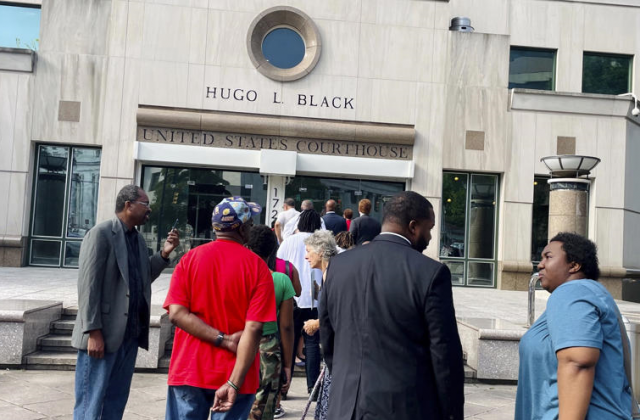
By Kim Chandler
Associated Press
Federal judges reviewing Alabama’s new congressional map on Monday sharply questioned if state lawmakers ignored the court’s directive to create a second-majority Black district, so minority voters have a fair opportunity to influence elections.
The three-judge panel held a hearing as they weigh whether to let the map stand or to step in and draw new congressional districts for the state. The panel heard arguments Monday but did not indicate when it would rule.
Alabama was forced to draw new district lines after the U.S. Supreme Court, in a surprise June decision, upheld the panel’s earlier finding that the state’s then-map — which had just one Black-majority district out of seven in a state where more than one in four residents is Black — likely violated the federal Voting Rights Act.
Lawyers for plaintiffs in the case argued Monday that the new plan, which maintains one majority-Black district, still discriminates against Black voters. They said it flouts the panel’s 2022 finding that Alabama should have two districts where Black voters comprise a majority or “something quite close to it.”
All three judges pointedly asked the state’s lawyer whether Alabama had ignored their finding that the state should have a second district where Black voters have an opportunity to elect their preferred candidates.
U.S. District Judge Terry F. Moorer asked if Alabama had chosen to “deliberately disregard” the court’s instruction. U.S. Circuit Judge Stanley Marcus asked the state, “Were you not required to draw a new map (that provides a reasonable) opportunity (district for Black voters)?”
Edmund LaCour, Alabama’s solicitor general, said the redrawn map was as “close as you get” to creating a second majority-Black district without violating the U.S. Constitution or traditional redistricting criteria.
“I think it is close as you get without violating the Constitution,” LaCour said.
LaCour accused the plaintiffs of seeking a “racial gerrymander” over traditional guidelines for drawing districts, such as keeping districts compact and keeping communities of interest together.
Abha Khanna, an attorney representing one group of plaintiffs in the case, said Alabama chose “defiance over compliance.”
“Alabama has chosen instead to thumb its nose at this court and to thumb its nose at the nation’s highest court and to thumb its nose at its own Black citizens,” Khanna said.
Khanna said Alabama essentially changed nothing for Black voters by passing a map that maintained a single majority-Black district and where the political wishes of white voters would continue to dominate election outcomes.
Alabama Republicans, who hold a legislative majority, have been reluctant to create a Democratic-leaning congressional district. They instead boosted the percentage of Black voters in the majority-white 2nd Congressional District, now represented by Republican Rep. Barry Moore, from about 30% to 39.9%.
State leaders are wagering that the panel will accept their proposal or that the state will prevail in a second round of appeals to the Supreme Court, which could again test the requirements of the Voting Rights Act.
The high-stakes hearing drew a large number of spectators to the federal courthouse in Birmingham where an overflow room was opened to accommodate the crowd. Plaintiffs in the Supreme Court case attended with many wearing T-shirts printed with their proposed map which would have two majority-Black districts.
“The law was really clear about what the issue is here. Did Alabama draw a new opportunity district as the court required them to do? The answer is they did not,” Deuel Ross, an attorney with the NAACP Legal Defense and Educational Fund who argued the case before the U.S. Supreme Court, said after court.
The state’s current political landscape is dominated by white Republicans who hold all statewide offices and every congressional seat but one. LaKeisha Chestnut, a plaintiff in the case, said putting her hometown of Mobile in a second-majority Black district would mean Black voters there “actually get a voice.”
“We have a very large African American population (in this state). It’s not all in Birmingham. It’s not all in Montgomery,” Chestnut said.



